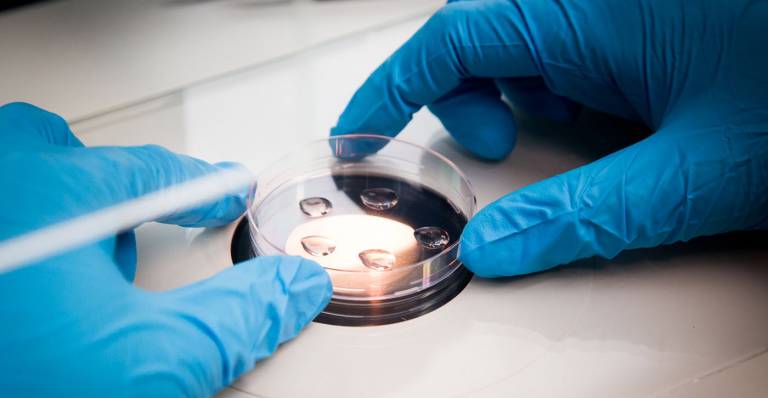Developing molecular diagnostics for pneumonia in hospitals
18 November 2015
Clinicians and scientists from UCLH, UCL and the University of East Anglia (UEA) have been awarded a £2.
 5 million grant
by the National Institute for Health Research to develop and evaluate new
molecular diagnostic tests.
5 million grant
by the National Institute for Health Research to develop and evaluate new
molecular diagnostic tests.
The tests aim to identify bacteria and their antibiotic sensitivities in under four hours. If successful, this will mean that patients get the right antibiotic sooner, and that doctors can better manage their stock of antibiotics, which is threatened by the accumulation of resistant bacteria.
The award to the team, led by Dr Vanya Gant and Dr Vicky Enne (UCL Infection & Immunity) and Dr Justin O'Grady and Prof David Livermore at UEA, is for their five-year programme "INHALE: Potential of Molecular Diagnostics for Hospital-Acquired and Ventilator-Associated Pneumonia in UK Critical Care".
The award is in addition to the 16 announced today by the National Institute for Health Research (NIHR), the research arm of the NHS, which has invested more than £15.8 million to date in this theme, with funding of further projects expected.
"Severely-ill hospital patients in intensive care often develop pneumonia. To treat this effectively with the right antibiotic doctors must know which bacteria are responsible. Secretions from the lungs and respiratory tract are sent to the microbiology laboratory, which grows the bacteria and finds out which antibiotics kill them. This takes two days or more, and a so-called 'broad-spectrum antibiotic', capable of killing many different types of bacteria, is given until the results become available," explained Dr Enne.
"This isn't ideal," said Dr O'Grady. "Some patients with pneumonia symptoms don't have bacterial infection. Others have highly resistant bacteria, not killed even by the broad-spectrum antibiotic -- this doubles the risk of death in severe pneumonia. On the other hand, many pneumonia patients have very susceptible bacteria and are 'over-treated' until the lab result becomes available. This overtreatment leads to undesirable side effects, for example C diff diarrhoea, and promotes resistance, making future infections harder to treat."
New 'molecular diagnostic' tests, which the team will study, aim to identify bacteria and their resistances directly from their genetic signatures in the respiratory secretions, with results in one to four hours. This will allow treatments to be refined earlier, benefiting individual patients and allowing the most potent antibiotics to be reserved for those who really need them.
"We need to know how well these tests agree with current methods. Do they find all the important types of resistant bacteria? Do they represent value for money? And will doctors act upon the result?" said Dr Gant. "INHALE addresses these important questions."
The team will test samples from patients with suspected pneumonia in the intensive care units of four hospitals, carefully chosen to represent different patient types and rates of resistance. They will test three new molecular diagnostic systems; seeing how accurate they are and see how easy they are to use. They will then select the best test and compare it to conventional treatment in a clinical trial, with half the patients receiving treatment guided by the new molecular diagnostic while the other half get treatment guided by current practice.
Clinical outcomes and the quality of antibiotic choice will be compared across the two groups, asking whether the molecular test allows equal or better outcomes with less use of the broad-spectrum antibiotics. The team will also review whether savings from treatment and better use of antibiotics offset the extra cost of the test.
Prof Livermore sums up the context: "If we use antibiotics better - precision strike rather than carpet bombing - we can cure patients and slow the development of resistance. The O'Neill Commission, which Prime Minister David Cameron set up to review antibiotic resistance, has recently stressed the potential of diagnostics. And INHALE will test this potential in a large and critically-ill group of patients."
The INHALE study is supported by the National Institute for Health Research Biomedical Research Centre at University College London Hospitals NHS Foundation Trust and University College London.
 Close
Close

